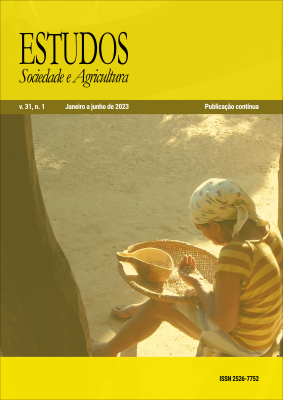Organization of the struggle for land in southeastern Pará through the Rural Workers’ Unions
DOI:
https://doi.org/10.36920/esa31-2_13Keywords:
Rural Trade Unions, peasant-squatters, southeastern ParáAbstract
This article is the result of research conducted in southeastern Pará (Brazil) to understand the process of territorialization in social and trade union movements in this region and their strategies to fight for land and remain on it after settlement projects were created. The work focused on the activity of the trade union movement, which originated in the organization and mobilization of peasant-squatters from the period of the Brazil nut economy (1920–1960) and later, the initial years of Amazonian "modernization" (1960–1990), and led to the deterritorialization of traditional (indigenous) peoples and communities as well as peasant-squatters. The movements consequently established various strategies to reterritorialize themselves, starting with the creation of settlements. Although this did not take place without conflict, it contributed to a change in the regional geography, in which peasants were able to mark out their territories and retrace their histories.
Downloads
Downloads
Published
Issue
Section
License
Copyright (c) 2023 Rogério Rego Miranda

This work is licensed under a Creative Commons Attribution 4.0 International License.
Authors who publish in this journal agree to the following terms:
a) Authors maintain the copyright and grant the journal the right of first publication, with the work simultaneously licensed under the Creative Commons Attribution License which allows the sharing of the work with acknowledgment of authorship and initial publication in this journal.
b) Authors are authorized to take additional contracts separately, for non-exclusive distribution of the version of the work published in this journal (eg publish in institutional repository or as a book chapter), with acknowledgment of authorship and initial publication in this journal.
c) Authors are allowed and encouraged to publish and distribute their work online (eg in institutional repositories or on their personal page) at any point before or during the editorial process, as this can generate productive changes, as well as increase the impact and citation of published work (See The Effect of Free Access).






